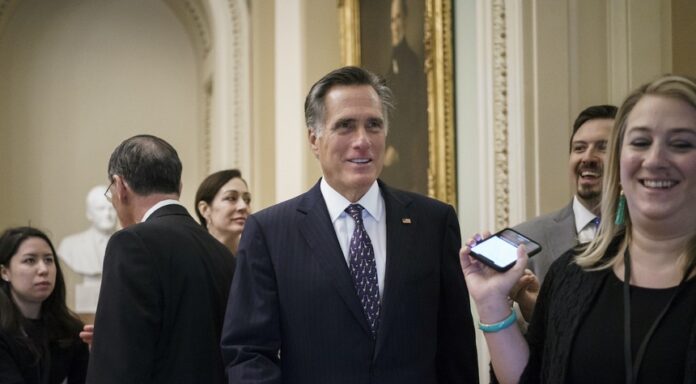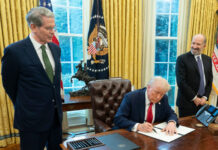It looks like ol’ Mitt is back at it again. Sen. Mitt Romney unveiled a rather interesting proposal to help the Republican establishment ensure that former President Donald Trump does not become the nominee for the 2024 presidential election.
Romney’s plan involves persuading wealthy donors not to support longshot candidates who do not perform well early in the primaries. His thinking is that this will eventually whittle the field down to one or two other candidates who could have a fighting chance at defeating the Orange Man What Is Bad™.
Could this plan work? Possibly, but there are some issues.
The senator dropped an op-ed on Monday in which he made the case for this plan:
Despite Donald Trump’s apparent inevitability, a baker’s dozen Republicans are hoping to become the party’s 2024 nominee for president. That is possible for any of them if the field narrows to a two-person race before Mr. Trump has the nomination sewn up. For that to happen, Republican megadonors and influencers—large and small—are going to have to do something they didn’t do in 2016: get candidates they support to agree to withdraw if and when their paths to the nomination are effectively closed. That decision day should be no later than, say, Feb. 26, the Monday following the contests in Iowa, New Hampshire, Nevada and South Carolina.
The idea is that if these megadonors stop funding candidates who have no chance of winning, they can leverage their dollars for those who might be better suited to taking on Trump.
In the piece, Romney noted that if action isn’t taken, these contenders “will split the non-Trump vote,” which would result in the former president securing the nomination. “A plurality is all that is needed for winner-take-all primaries,” he wrote.
The lawmaker and failed presidential candidate also told reporters that he has received support behind the scenes for this strategy:
Romney told The Hill he targeted his op-ed at major Republican donors, who in the last competitive Republican presidential primary stuck with their favored candidates for too long, splitting up the support of GOP voters who didn’t initially favor Trump.
“A number of folks have sent me texts or emails saying, ‘Hey, well done, I agree with you,’” he said. “That was really aimed at large donors and hopefully they take that into stride.”
“Donors feel the loyalty to the candidate and the candidates want to stay in. That’s the nature of a politician, which is, ‘I’m going to fight to the end. I’m not a quitter,’” he said.
Instead, Romney says donors need to intervene for the good of the party, telling long-shot White House hopefuls: “No, no. Put that aside. What’s the right thing for the country, and your party?”
Naturally, this raises a question: Does this strategy provide a pathway to victory for the anti-Trump crowd?
It is certainly not out of the question.
If donors and influencers coalesce behind a strong candidate like Florida Gov. Ron DeSantis, Vivek Ramaswamy, or Sen. Tim Scott, it could happen. If they can win broad appeal and convince the base that they are the best shot the GOP has at defeating President Joe Biden, this might be enough to push this person over the finish line ahead of Trump.
Even beyond that, if this candidate does well in the early primaries in Iowa, Nevada, New Hampshire, and South Carolina, it might galvanize voters who would rather see someone else take up the mantle other than the former president. If the longshot candidates know that their sources of funding are going to dry up, they could be convinced to drop out of the race earlier instead of remaining in the race.
However, neither of these scenarios is guaranteed.
There are several ways this plan could wind up like Romney’s 2012 campaign. Indeed, RedState’s Joe Cunningham brought this up in his article on the story:
No, if you want to actually get candidates to bow out of the race, you really need to do one thing: Rein in the damn consultants.
Romney’s own presidential campaign was plagued by chaos among his consultants, some of which made headlines. His political strategist, Stuart Stevens, made last-minute changes ahead of the national convention that created days of negative headlines. His campaign was so plagued by in-fighting that advisers were eager to spill the beans to multiple news outlets.
Aside from the consultant issue, there is also the possibility that there won’t be only one or two strong, viable candidates to challenge Trump early in the primaries. Let’s say there are three or four who could potentially pose a threat to the former president’s chances of winning. In this case, the megadonors might not be so gung-ho about pulling their funding if they think their guy or gal might have what it takes to secure a victory.
There is also the fact that Trump still enjoys widespread popularity in the party. Currently, he is 34 points ahead of DeSantis, who remains in a distant second place despite some hiccups with his campaign. Even if Romney can persuade megadonors to follow his plan, the former president might still be too popular with the base for any candidate to successfully challenge him.
It’s still too early to ascertain whether the odds are in Romney’s favor. But I will admit: His plan is probably the best shot at getting a GOP nominee who is not named Donald J. Trump.




